SWEDISH SOUTH ASIAN STUDIES NETWORK
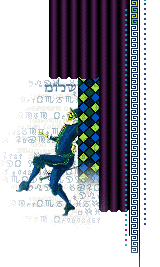
Department of Musicology and Performance Studies,
Stockholm University:
Postal address: Teater- och dansvetenskap, Stockholm University, S-106 91 Stockholm
Visiting address: Universitetsvägen 10 D, 8th floor –
Campus Frescati
Fax: +46 (0)8 6747490
Web page: http://www.teater.su.se/
Contact person: Professor Willmar Sauter, phone: +46 (0)8 674 7480.
Also Head of Research, School of Aesthetics at Stockholm University
In Sweden, Theatre Studies can only be studied in Stockholm and the studies are strictly theoretical. Teaching of Theatre history started in 1941 in close connection with the Drottningholm Court Theatre and The Drottningholm Theatre Museum, Archive and Library. On 1 January 2005 the Dept. of Theatre Studies was merged with the Dept. of Musicology.
Research connected to South Asia
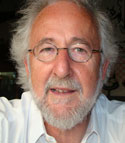 Prof. Willmar Sauter has a longstanding and broad international experience as president of the International Federation for Theatre Research (IFTR, 1991–95), for which he also has organized a Working Group on the Theatrical Event (since 1997). He has lectured in many countries, including India, China and Japan. He has also served as Dean at Stockholm University and is presently the Head of the Research School of Aesthetics.
Prof. Willmar Sauter has a longstanding and broad international experience as president of the International Federation for Theatre Research (IFTR, 1991–95), for which he also has organized a Working Group on the Theatrical Event (since 1997). He has lectured in many countries, including India, China and Japan. He has also served as Dean at Stockholm University and is presently the Head of the Research School of Aesthetics.
Prof. Sauter has developed the theory of the Theatrical Event in a number of books and articles, e g ”Understanding Theatre: Performance Analysis in Theory and Practice” (Stockholm 1995), and ”The Theatrical Event: Dynamics of Performance and Perception” (Iowa City, 2000). This theory has proved to be applicable to a number of research objectives, since it brings together the performer and the spectator in their social and aesthetic context. As a holistic theory, it is especially suitable for the study of performances outside the traditional Western canon.
In November, 2008, Willmar Sauter lectured at the University of Hyderabad on the topic: 'Strolling Players, Playing Culture & Cultural Performances: Theoretical and Historical Aspects of Theatrical Events'. The lecture was organised by the Nordic Centre in India (NCI) in collaboration with the Sarojini Naidu School of Performing Arts, Fine Arts & Communication of the University of Hyderabad.
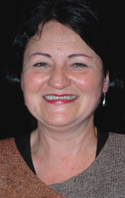 Associate professor Christina
Nygren has dedicated
more than 20 years of her life to extensive studies of theatre, history
and languages in China and Japan, from 1980 onwards spending long periods
at universities and academies in the two countries. She defended her doctoral
dissertation on ”Encounter between East and
West. Metaphor and Convention in a Japanese Shingeki Performance”
in 1993.
Associate professor Christina
Nygren has dedicated
more than 20 years of her life to extensive studies of theatre, history
and languages in China and Japan, from 1980 onwards spending long periods
at universities and academies in the two countries. She defended her doctoral
dissertation on ”Encounter between East and
West. Metaphor and Convention in a Japanese Shingeki Performance”
in 1993.
During the second half of the 1990’s she was involved in a research
project on popular culture in these countries, with extensive field work
financed by the Swedish Council for Research in the Humanities and Social
Sciences (HSFR/R). The project was tilted ”Popular
Theatre in Context – An Intercultural Perspecive”,
and it was later published as a book called ”Ghosts, Generals
and Gorgeous godesses. Travelling theatres, religious festivals and popular
amusement in contemporary Japan and China” (Carlssons, 2000).
Read a review of the book, written by Magnus Fiskesjö.
From the Spring 2010, Dr. Nygren is working as a Visiting Research Fellow at the Dept. of Oriental Languages, Stockholm University. She is involved in a new research project focusing on the Sundarbans regin of Bangladesh. ![]()
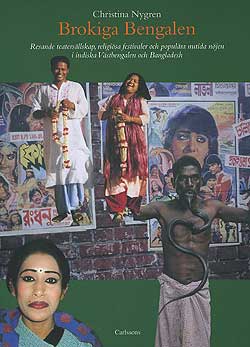 In the beginning of the 1990’s Christina Nygren more
and more turned her attention towards India and Bangladesh. In 2000
she started a research project titled ”Perspectives
on Popular Theatre – Bengal as religious, artistic and social
context for popular theatre and dance”, financed
by Stockholm University ”faculty resource” funds. The project
has been carried out in collaboration with the National
Museum,
Centre For Asian Studies and the National Yatra
Association, all in Bangladesh; amd the Rabindra
Bharati University and the Paschimbanga Natya
Akademy in Kolkata, India. The project has focused on the popular
forms of theatre prevalent in Bengal, especially yatra,
and is based on extensive visits to cities and villages in the Indian
state of West Bengal and in Bangladesh. will result in a book. It
resulted in a book titled ”Brokiga
Bengalen, Resande teatersällskap,
religiösa
festivaler och populära nutida nöjen i indiska Västbengalen
och Bangladesh”, published in 2006. More information
about the book.
In the beginning of the 1990’s Christina Nygren more
and more turned her attention towards India and Bangladesh. In 2000
she started a research project titled ”Perspectives
on Popular Theatre – Bengal as religious, artistic and social
context for popular theatre and dance”, financed
by Stockholm University ”faculty resource” funds. The project
has been carried out in collaboration with the National
Museum,
Centre For Asian Studies and the National Yatra
Association, all in Bangladesh; amd the Rabindra
Bharati University and the Paschimbanga Natya
Akademy in Kolkata, India. The project has focused on the popular
forms of theatre prevalent in Bengal, especially yatra,
and is based on extensive visits to cities and villages in the Indian
state of West Bengal and in Bangladesh. will result in a book. It
resulted in a book titled ”Brokiga
Bengalen, Resande teatersällskap,
religiösa
festivaler och populära nutida nöjen i indiska Västbengalen
och Bangladesh”, published in 2006. More information
about the book.
When this project is finished she will proceed with a wider comparatibe research project on the theatre sector in the entire region of South and East Asia, including Nepal, Sri Lanka, Vietnam, Laos and China. This project is supposed to be funded by Sida/SAREC.
Between 1999 and 2004 Christina Nygren collaborated
in a research project run by the Department
of Oriental Languages at Stockholm University (but with shared
responsibility by several universities in Sweden). As part of a major
comparative research project on ”Literature
and Literary History in Global Contexts” Nygren
has been a member of the Working group 2, focusing on ”Literary
Genres: An Intercultural Approach”; and Working group 3, ”Encounters
between Literary Cultures in the 19th and 20th Centuries”.
The project was funded by the Swedish
Research Council.
In late 2006, the project finally materialised in a set of four volumes
being published by Walter de Gruyter in Berlin & New York. Christina
Nygren has written two articles titled ”Drama for learning
and pleasure: Japan, China and India in a comparative perspective”,
and ”Appropriations
of European theatre in Japan, China and India” respectively.
More information.
Over the years she has also been very productive as a free lance writer on Performing Arts and Popular Culture in Asia. Go for a list of her publications.
Besides pure research work Christina Nygren has been travelling extensively in Asia, particiating in workshops and seminars. In 1992 she visited the traditional Dance Festival in Khajuraho and the Festival of Modern Theatre in New Delhi, and later on participated in an International Seminar on the ”Impact of International Interaction in Contemporary Theatre” and a theatre festival in Dhaka, Bangladesh.
In 1994 she worked as a visiting lecturer in Bangladesh, invited by the Centre for Asian Theatre and the universities in Dhaka and Chittagong. In 1995 she took part in a joint project on ”Probable Application of Western Drama in Indian Theatre” together with Kamaluddin Nilu, Bangladesh. Exchange contacts were also established with the National School of Drama in New Delhi and Kolkata University.
Nygren was co-ordinator of an international seminar with lectures and discussions on ”Theatre in human life” in November 1996, at the occasion of the Stockholm University Dept. of Theatre’s 50th anniversary. In January 2003 she was the keynote speaker at the International Federation for Theatre Research (IFTR's) world conference in Jaipur, India, speaking on ”Travelling Theatre in Japan, China, India and Bangladesh”.
Since January 2004 Christina Nygren is working as a project leader for a collaboration project in the field of theatre and dance for children and youth in Southeast and East Asia (funded by Sida and the Swedish International Theatre Institute, ITI), and she is also since August 2004 assigned to undertake an extended project proposal in the same region, including Vietnam, Laos and China.
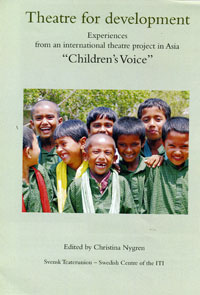 Besides this she is also on part-time project leader involved
in a five-year project called ”Voices of the Children” (Barnens Röst),
aimed at strengthening children’s theatre in Asia. This project
is also funded by Sida and includes an exchange of Swedish and Indian/Bangladeshi
theatre groups during 2004 and 2005. The first group to visit Sweden was
the Rupantar group from Khulna, Bangladesh, that performed in Stockholm
in March 2004 (see box above to the right).
Besides this she is also on part-time project leader involved
in a five-year project called ”Voices of the Children” (Barnens Röst),
aimed at strengthening children’s theatre in Asia. This project
is also funded by Sida and includes an exchange of Swedish and Indian/Bangladeshi
theatre groups during 2004 and 2005. The first group to visit Sweden was
the Rupantar group from Khulna, Bangladesh, that performed in Stockholm
in March 2004 (see box above to the right).
In
February 2005 the Swedish puppet theatre group Tittut visited Bangladesh,
where they organised a workshop in Khulna. Another two theatre groups
have visited India/Bangladesh recently as paret of the Sida project, namely
Teater Pero from Stockholm and Slava Theatre from Huddinge. More information about the project.
The Voices of the Children project was completed in 2009, and has now resulted in the publication of a book, entitled ”Theatre for Development. Experiences from an international theatre project in Asia”. On Wednesday 16 September 2009, a book release party was held in Stockholm, at Teater Påfågeln, St Eriksgatan 84. The project leader, Dr. Christina Nygren participated along with Ms. Ann Mari Engel, General Secretary, Svensk Teaterunion.
Rudraprasad Sengupta from the theatre group Nandan in Kolkata, India, also participated, talking about Nandan’s long work to engage children and youth from vulnerable groups in theatre activities. ![]()
As an activity completely separate from the Sida project
Christina Nygren in March 2005 organised a tour to Sweden of ten folk
musicians, dancers and singers from Purulia, in the western part of the
Indian state of West Bengal, to Sweden in March 2005.
The group gave a performance called ”Bengali
Night” featuring suggestive so-called jhumu
music and nachni dance (by Shonda Rani), at Södra Teatern
in Stockholm on Friday 11 March 2005. A group of baul singers
from the same region also took part in the show.
The day before the performance in Strockholm, on Thursday 10 March 2005,
Christina Nygren organised a seminar on ”Traditional Bengali
theatre, culture and music” with the ten artists from Purulia.
The seminar was held at Tonsalen in the Slava Theatre in Huddinge, south
of Stockholm. Shonda Rani danced along with Balaram Singh Sardar, playing
the madhol drum (photo to the right). More
information on the Huddinge seminar.
In previous years she has similarly engaged in suggesting, facilitating and introducing many other Chinese, Indian and Bangladeshi artists coming to Sweden for guest performances at e g Göteborg Dance- and Theatre Festival in 2000 and 2002, and the Re:Orient festival in Stockholm 2003. As a free lancer she even produced a number of programs for Swedish Radio with Baul artists from Bangladesh.
Education on non-Western theatre and dance
A 7,5 credits intermediate course on Non-Western Theatre and Dance is held every year, in March and October. The course is directed by Christina Nygren. The course aims to provide knowledge about theatre and dance within a limited geographical area with a common cultural background outside the Euro-American theatre tradition. The course includes theatre history with an introduction of source material and an analytical survey of structure and patterns in performances and dramas. The course also aims to increase conciousness of intra-cultural problems and to provide a global perspective.
Workshop on Marginalized Performance Practices in India
In September 2009, Prof. Willmar Sauter received a SASNET planning grant, for the organisation of an interdisciplinary workshop entitled ”Interdisciplinary Approaches to Marginalized Performance Practices in India”. More information about the 2009 SASNET planning grants.
The aim was to bring together scholars with different disciplinary backgrounds to examine whether and/or how the marginalized performance practices in India reflect and respond to changing social, political and cultural conditions.
Abstract: Any performative practice offers a broad range of possibilities for conceptual, contextual, critical and aesthetic analysis of the society and the aspirations of the society members. Our intention is to shed light on India’s marginalized performance practices from inter- and intra-disciplinary perspectives exploring both conceptual premises and applications, as well as means of preserving and mediating the performances to the scholars and wider audiences for further investigation. The issue of marginalized groups in the Indian society has attained interest only in the recent decade and unless the oral performance practices are made known and available, the tradition will likely remain marginalized.
Marginalized performance practices are understood here as (i) performances which fall in the category of folk theatre (contrasted to institutionalized ‘high’ theatre) in its broad sense including narration, recitation, dialogue, singing and dancing; (ii) performances practiced by performers belonging to the marginalized groups (adivasis, low caste groups, dalits, religious minorities, gender related minorities such as females and the third gender, and sexual minorities); (iii) performances employing not officially recognized local and regional languages and dialects; (iv) performances set up in geographically and politically peripheral locations such as interstate border regions or suburban neighborhoods. One or more of the categories qualify for the definition of a marginalized performance.
The workshop, held in Ytterjärna 2–5 June 2010, opened with presentations
and discussions of the current research that each of the participants is or
has been involved in. ![]()
Aspects of terminology, definitions and methods were
rapidly included into the group's reflections. Theatre, dance, rituals,
ceremonies, linguistic aspects as well as isues of documentation, research
aims and possibilities were intensively discussed during two days. Also
ethical and epistemological questions were raised.
Based on the discussions and on the presentations of audiovisual
materials, the group decided to pursue the establishment of an India-based
project, called 'Marginalized Performance Practices: Documentation
Project'. Physically, a data base will be built up, using already existing
facilities at JNU in New Delhi with support from the University of
Hyderabad. The collaboration with departments at Stockholm University
(Theatre and Dance, Indology, Computer Science) will be coordinated by NCI.
The participants of the workshop agreed upon a statement outlining the
overall purpose of the project, terms of participation and perspectives on
its future development.
Besides Prof. Sauter and Associate Professor Christina Nygren from the Dept. of Musicology and Performance Studies, researchers at a number of other Swedish and Indian departments participated in the workshop:
At Stockholm University:
– Dr. Mirja Juntunen, Lecturer at the Dept. of South and Central Asian Studies and ForSCAS (and Director of the Nordic Centre in India).
– Researcher Nikos Dimitrakas, Dept. of Computer ScienceIn India:
– Prof. H.S. Shiva Prakash, Dean of the Faculty School of Arts & Aesthetics, Jawaharlal Nehru University (JNU), New Delhi. Prof. Prakash regularly lectures on ‘Documenting Traditional and Marginalized Performance’ at the Department of Performing Arts at JNU.
– Ass. Prof. Bishnupriya Paul, School of Arts and Aesthetics, JNU
– Prof. B. Anandhakrishna, Head of the Sarojini Naidu School of Performing Arts, University of Hyderabad, who has documented a large number of performance traditions of South India.
SASNET - Swedish South Asian Studies Network/Lund
University
Address: Scheelevägen 15 D, SE-223 63 Lund, Sweden
Phone: +46 46 222 73 40
Webmaster: Lars Eklund
Last updated
2011-06-22
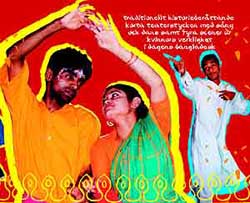 he
Bangladeshi Theatre troupe Rupantar, part of a Khulna-based NGO working
professionally with drama, dance, and music, gave performances in
Stockholm 27–28 March 2004. Rupantar has an ambition to increase
people’s consciousness about democracy, equality, environment
and children’s rights through their plays. They have also drawn
attention to the plight of Bangladesh’s unique mangrove forests,
the Sundarbans. This is combined with with developing a new way
of expressing themselves called ALT (Alternative Living Theatre),
inexpensive performances based on body language and frequent use of
make-up. The performances in Stockholm were arranged by Svensk Teaterunion,
and took place at Aliasteatern and at Etnografiska Museet.
he
Bangladeshi Theatre troupe Rupantar, part of a Khulna-based NGO working
professionally with drama, dance, and music, gave performances in
Stockholm 27–28 March 2004. Rupantar has an ambition to increase
people’s consciousness about democracy, equality, environment
and children’s rights through their plays. They have also drawn
attention to the plight of Bangladesh’s unique mangrove forests,
the Sundarbans. This is combined with with developing a new way
of expressing themselves called ALT (Alternative Living Theatre),
inexpensive performances based on body language and frequent use of
make-up. The performances in Stockholm were arranged by Svensk Teaterunion,
and took place at Aliasteatern and at Etnografiska Museet. 